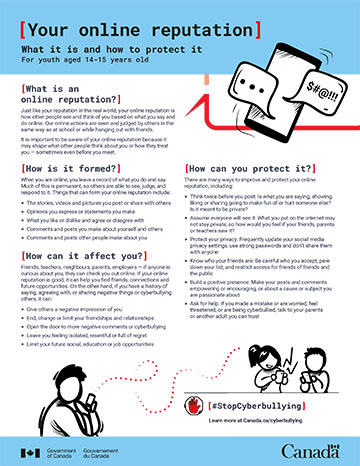Fact sheet for ages 14-15 about an online reputation
Your online reputation: What it is and how to protect it
For youth aged 14-15 years old
What is an online reputation?
Just like your reputation in the real world, your online reputation is how other people see and think of you based on what you say and do online. Our online actions are seen and judged by others in the same way as at school or while hanging out with friends.
It is important to be aware of your online reputation because it may shape what other people think about you or how they treat you — sometimes even before you meet.
How is it formed?
When you are online, you leave a record of what you do and say. Much of this is permanent, so others are able to see, judge, and respond to it. Things that can form your online reputation include:
- The stories, videos and pictures you post or share with others
- Opinions you express or statements you make
- What you like or dislike and agree or disagree with
- Comments and posts you make about yourself and others
- Comments and posts other people make about you
How can it affect you?
Friends, teachers, neighbours, parents, employers — if anyone is curious about you, they can check you out online. If your online reputation is good, it can help you find friends, connections and future opportunities. On the other hand, if you have a history of saying, agreeing with, or sharing negative things or cyberbullying others, it can:
- Give others a negative impression of you
- End, change or limit your friendships and relationships
- Open the door to more negative comments or cyberbullying
- Leave you feeling isolated, resentful or full of regret
- Limit your future social, education or job opportunities
How can you protect it?
There are many ways to improve and protect your online reputation, including:
- Think twice before you post: Is what you are saying, showing, liking or sharing going to make fun of or hurt someone else? Is it meant to be private?
- Assume everyone will see it: What you put on the internet may not stay private, so how would you feel if your friends, parents or teachers saw it?
- Protect your privacy: Frequently update your social media privacy settings, use strong passwords and don’t share them with anyone
- Know who your friends are: Be careful who you accept, pare down your list, and restrict access for friends of friends and the public
- Build a positive presence: Make your posts and comments empowering or encouraging, or about a cause or subject you are passionate about
- Ask for help: If you made a mistake or are worried, feel threatened, or are being cyberbullied, talk to your parents or another adult you can trust
#StopCyberbullying
Learn more at Canada.ca/cyberbullying
Page details
- Date modified:
